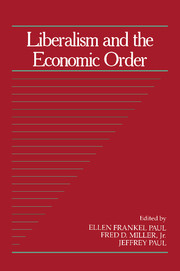Book contents
- Frontmatter
- Contents
- Introduction
- Acknowledgments
- Contributors
- The Social Market Economy
- From Post-Communism to Civil Society: The Reemergence of History and the Decline of the Western Model
- Asymmetrical Reciprocity in Market Exchange: Implications for Economies in Transition
- Institutions, Nationalism, and the Transition Process in Eastern Europe
- The Economic and Political Liberalization of Socialism: The Fundamental Problem of Property Rights
- Democracy, Markets, and the Legal Order: Notes on the Nature of Politics in a Radically Liberal Society
- Liberalism: Political and Economic
- Socialism as the Extension of Democracy
- Liberalism, Welfare Economics, and Freedom
- Some Rules of Constitutional Design
- The Morality of Inclusion
- A New Contractarian View of Tax and Regulatory Policy in the Emerging Market Economies
- Associations and Democracy
- Index
Associations and Democracy
Published online by Cambridge University Press: 05 October 2010
- Frontmatter
- Contents
- Introduction
- Acknowledgments
- Contributors
- The Social Market Economy
- From Post-Communism to Civil Society: The Reemergence of History and the Decline of the Western Model
- Asymmetrical Reciprocity in Market Exchange: Implications for Economies in Transition
- Institutions, Nationalism, and the Transition Process in Eastern Europe
- The Economic and Political Liberalization of Socialism: The Fundamental Problem of Property Rights
- Democracy, Markets, and the Legal Order: Notes on the Nature of Politics in a Radically Liberal Society
- Liberalism: Political and Economic
- Socialism as the Extension of Democracy
- Liberalism, Welfare Economics, and Freedom
- Some Rules of Constitutional Design
- The Morality of Inclusion
- A New Contractarian View of Tax and Regulatory Policy in the Emerging Market Economies
- Associations and Democracy
- Index
Summary
INTRODUCTION
Since the publication of John Rawls's A Theory of Justice, normative democratic theory has focused principally on three tasks: refining principles of justice, clarifying the nature of political justification, and exploring the public policies required to ensure a just distribution of education, health care, and other basic resources. Much less attention has been devoted to examining the political institutions and social arrangements that might plausibly implement reasonable political principles. Moreover, the amount of attention paid to issues of organizational and institutional implementation has varied sharply across the different species of normative theory. Neoliberal theorists, concerned chiefly with protecting liberty by taming power, and essentially hostile to the affirmative state, have been far more sensitive to such issues than egalitarian-democratic theorists, who simultaneously embrace classically liberal concerns with choice, egalitarian concerns with the distribution of resources, and a republican emphasis on the values of citizen participation and public debate (we sketch such a conception below in Section I). Neglect of how such val- ues might be implemented has deepened the vulnerability of egalitarian-democratic views to the charge of being unrealistic: “good in theory but not so good in practice.”
In this essay we address this vulnerability by examining the constructive role that “secondary” associations – labor unions, employer associations, citizen lobbies and advocacy groups, private service organizations, other private groups – can play in a democracy. Our central contention is that, as a practical matter, implementing democratic norms requires a high level of secondary group organization of a certain kind.
- Type
- Chapter
- Information
- Liberalism and the Economic Order , pp. 282 - 312Publisher: Cambridge University PressPrint publication year: 1993
- 1
- Cited by

